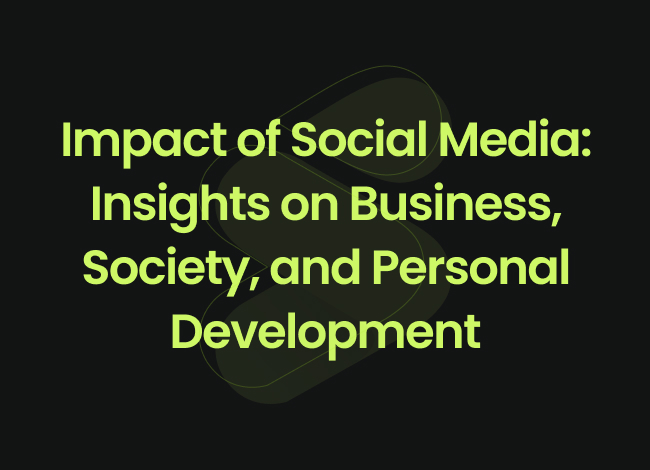Introduction
Social media has become integral to our daily lives, shaping how we communicate, learn, and do business. Its influence is evident across sectors, from marketing and education to social interactions and global communications. While social media empowers businesses and connects individuals, it also presents challenges, such as privacy concerns and mental health impacts. This article dives into the positive and negative effects of social media, offering insights on how businesses and individuals can make the most of its potential.

Pros and Cons of Social Media for Businesses
When used strategically, effective social media use by businesses can enable significant enhancements in visibility, customer relations, and brand reputation. Let’s explore the major pros and cons of social media for businesses:
Pros
- Enhanced Brand Reach and Awareness: Social media enables businesses to reach broader audiences, targeting specific demographics and fostering brand recognition.
- Customer Engagement and Feedback: Platforms provide a direct communication channel, helping brands interact with customers, respond to feedback, and build trust.
- Cost-Effective Marketing: Social media is often more affordable than traditional advertising, making it accessible to businesses of all sizes.
Cons
- Risk of Negative Publicity: Negative comments or viral complaints can harm brand reputation if not managed effectively.
- Privacy and Data Security: Handling customer data on social media requires strict security to avoid breaches and protect user information.
- Dependence on Platform Algorithms: Business visibility often relies on algorithms, meaning organic reach can be inconsistent and requires constant adaptation.
Positive and Negative Impacts of Social Media on Society
Social media influences society in profound ways, bringing communities together and facilitating access to information. However, it also raises concerns that affect well-being and social structures.
Positive Impacts
- Building Community Connections: Social media allows people to find support communities and connect with like-minded individuals worldwide.
- Access to Information and Resources: Users have endless educational content at their fingertips, from news to online courses and DIY tutorials.
- Social Movements and Awareness: Social media empowers people to advocate for change, spread awareness on important issues, and mobilize collective action.
Negative Impacts
- Mental Health Concerns: Constant comparison and exposure to idealized lifestyles can contribute to anxiety, depression, and low self-esteem.
- Spread of Misinformation: Social platforms can quickly amplify false information, affecting public perception and creating social panic.
- Privacy Risks: Data collection and privacy concerns can lead to misuse of personal information, affecting user trust and security.
Top Pros and Cons of Social Media for Individuals and Society
To understand social media’s broader effects, here are the top five pros and cons that impact users on a personal level.
Top 5 Pros:
- Ease of Communication: Social media allows instant communication across distances, bringing families and friends closer.
- Learning and Personal Development: Individuals have access to resources for self-improvement and learning new skills.
- Opportunities for Collaboration: Social media connects professionals and creatives, enabling collaborations across the globe.
- Access to Global News and Events: Users stay informed and connected to current events, fostering global awareness.
- Encouragement of Creativity: Platforms like Instagram, TikTok, and YouTube allow users to express themselves creatively.
Top 5 Cons:
- Addiction and Time Consumption: Excessive social media use can lead to addiction, reducing productivity and affecting mental health.
- Cyberbullying and Harassment: Online harassment is prevalent, with lasting impacts on victims’ self-esteem and mental well-being.
- Social Comparison and Mental Health Issues: Comparing oneself to others’ curated lives can lead to feelings of inadequacy.
- Information Overload: The constant stream of content can overwhelm users, leading to digital fatigue.
- Privacy Invasion: Sharing personal information comes with risks of data misuse and potential privacy invasion.
How Social Media Impacts Communication Skills
Social media has revolutionized how we communicate, bringing both positive and negative effects on communication skills.
Positive Effects: Social media allows people to communicate across cultures, helping users become more adaptable in their interactions. The variety of communication tools, from direct messages to video chats, fosters diverse communication styles.
Negative Effects: Excessive social media use can hinder face-to-face interaction skills, reducing attention spans and making it challenging to maintain meaningful offline conversations.
The Role of Social Media in Education
Social media is a double-edged sword in education, offering access to resources but also posing risks.
Benefits: Students and educators can access information instantly, participate in global discussions, and collaborate on projects. Social media also supports remote learning, making education more inclusive and accessible.
Challenges: Social media can be distracting for students, leading to procrastination and reduced focus. Additionally, misinformation can easily spread, requiring students to develop critical thinking skills to evaluate content reliability.
Impact of Social Media on Students
The impact of social media on students is profound, affecting academic performance, social skills, and well-being.
Positive Impact: Social media connects students to educational content and peer support, enhancing collaborative learning. Platforms also facilitate networking, allowing students to interact with experts in various fields. Negative Impact: Students face challenges like cyberbullying, which affects mental health. The constant pull of social media can also disrupt focus and sleep patterns, impacting academic performance.
Cause and Effect: Understanding Social Media’s Impact on Society
Social media’s impact is rooted in its immediacy and reach, allowing it to influence behaviors, social norms, and cultural perceptions.
Causes: The appeal of instant interaction and vast connectivity attracts users of all ages. However, this attraction can lead to addictive behavior, affecting mental health and societal values.
Effects on Society: Over time, social media influences public opinion, social interactions, and lifestyle choices. From political discourse to cultural trends, its influence permeates all levels of society, both positively and negatively.
Strategies for Responsible and Effective Social Media Use
To optimize social media use, businesses and individuals alike should consider these strategies:
For Businesses:
- Engage Authentically: Use social media to create genuine connections, rather than purely focusing on sales.
- Educate the Audience: Provide credible information, fostering an informed user base and reducing misinformation.
For Individuals:
- Set Boundaries: Limiting screen time helps maintain a healthy balance, reducing dependency on social media.
- Verify Sources: Avoid sharing unverified information, especially news, to curb misinformation.
- Prioritize Mental Well-being: Practice mindfulness and self-care to counteract potential mental health impacts.
Conclusion
Social media is a powerful tool with the potential for both good and harm. By understanding its pros and cons, businesses and individuals can make informed choices, maximizing its benefits while addressing its challenges. Responsible usage can transform social media into a source of growth, connection, and knowledge rather than a source of stress or misinformation.
People Also Ask
Social media enhances brand visibility, customer engagement, and cost-effective marketing but poses risks like negative publicity, privacy concerns, and reliance on algorithm changes.
Positively, social media builds connections and provides access to information. Negatively, it can harm mental health, spread misinformation, and compromise privacy.
Top pros include ease of communication, educational resources, collaboration opportunities, global awareness, and creative expression. Major cons are addiction, cyberbullying, social comparison, information overload, and privacy risks.
Social media shapes public opinion, cultural norms, and individual behaviors, influencing how society interacts, communicates, and perceives itself both locally and globally.






